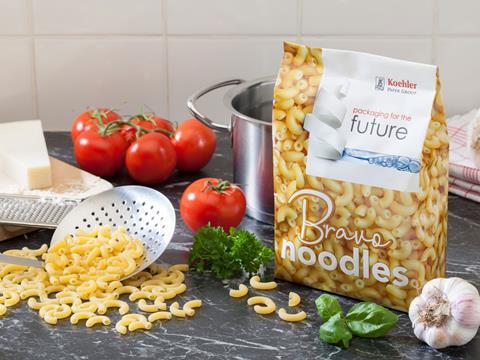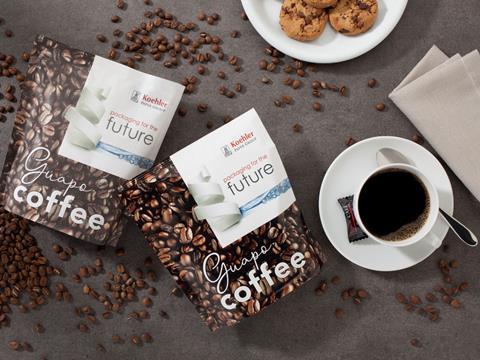
In this article, the German company Koehler Paper Group gives its view on the place of paper as a material for flexible packaging.
Paper plays an important role in the mix of future packaging materials. No other material can offer the same sustainability and recyclability. In a short time, Koehler Paper Group has gone from being a challenger to becoming a thought leader in the market for sustainable flexible packaging solutions.
It already became clear at the FachPack 2019 trade fair in Nuremberg that the future of flexible packaging materials would not revolve around the question of whether paper would play a role in this. Paper is firmly established as a more sustainable alternative to the multitude of plastic solutions that have come onto the market in the past.
Paper: More sustainable and desired by consumers
In a world in which the oceans and forests are already overflowing with plastic waste and this waste is returning to the people via the food chain, new ways and perspectives on packaging materials are of fundamental importance. The raw material of packaging must not be obtained, or at least not exclusively from finite resources. The use of renewable raw materials must be the claim, in addition to the solution of recycling cycles. For paper, these cycles have already been solved, established, and are widely used by consumers.
The paper industry is working on solutions to achieve barrier properties and processing possibilities that previously only film could offer. At FachPack, the Koehler Paper Group from the southwest German Black Forest was already able to present a heat-sealable paper that has now been added to the standard portfolio.
Paper manufacturers assume responsibility
Koehler has brought the paper onto the market under the name Koehler NexPlus® Seal. In addition to heat sealability, the paper also offers a MOSH/MOAH barrier and is produced and offered in grammages of 45, 65, and 80 grams per square metre.
"As a paper manufacturer, we see it as our responsibility to provide more sustainable solutions for the flexible packaging sector," says Eckhard Kallies, Division Director Flexible Packaging Paper. "Our main assets are renewable and recyclable raw materials. Together with our partners, we have demonstrated that our papers are running efficiently on existing converting and packaging machines, without making any compromises.”

Heat-sealable paper already successfully in use
Further processing was indeed seen as a problem in the past. The perception was paper behaves differently to foil, is not as flexible and tears faster. "We are working closely with packaging machine manufacturers and have achieved excellent results," says Kallies. "Only very minor adjustments were needed on the packaging lines. Our paper runs as well as film on these machines." In addition, the paper can score points for printability.
Customers already using the paper also confirm the good experiences Kallies reports. One of the first customers to use Koehler NexPlus® Seal is " Kalfany Süße Werbung“ (Kalfany Sweet Advertisement), a company that produces branded sweets as promotional items. "Packaging has various functions," explains Klaus Richter, Managing Director at Kalfany. "In addition to brand message and product protection, there is now also the requirement that packaging should be recyclable and, in the best case, manufactured in a completely climate-neutral way. Where possible, we replace existing packaging with more sustainable alternatives. We can already use Koehler NexPlus® Seal for sugar-coated products".
Koehler NexPlus® Seal for food and non-food applications
Further processing is also not a problem, said Richter. It is true that the bag sizes cannot be infinitely small, and the material is also not as flexible as film. But a bag width of 60 millimetres has been achieved, which meets the requirements.
In addition to the sugar-coated products mentioned by Richter, Koehler NexPlus® Seal is also suitable for other foods that do not require elaborate barriers. And of course, the entire non-food sector can also be wrapped in the paper. The paper is particularly suitable for gravure and flexo printing, and the ink and varnish levels are excellent.
This and all other flexible packaging papers from Koehler are produced on the new production line 8, which went into operation in October 2019 and in which Koehler has invested around 300 million euros. In addition to a paper machine, production line 8 also includes a coating machine, both of which redefine the industry standard.
High barriers in development, kraft papers in the portfolio
Besides Koehler NexPlus® Seal, the company also produces coated and uncoated kraft papers for the flexible packaging sector. A strong focus is on the development of more complex barriers in order to be able to offer paper as a more sustainable packaging solution for other applications and to replace plastic in flexible packaging where possible and reasonable.
In this way, Koehler is responding to the needs that customers have expressed to manufacturers like Kalfany. The advertising material manufacturer is confronted with questions relating to sustainability, says Klaus Richter. Customers would even accept a somewhat shorter minimum shelf life if the packaging material was more sustainable. "With the sweets wrapped in paper, we now have a very good product in our range."













